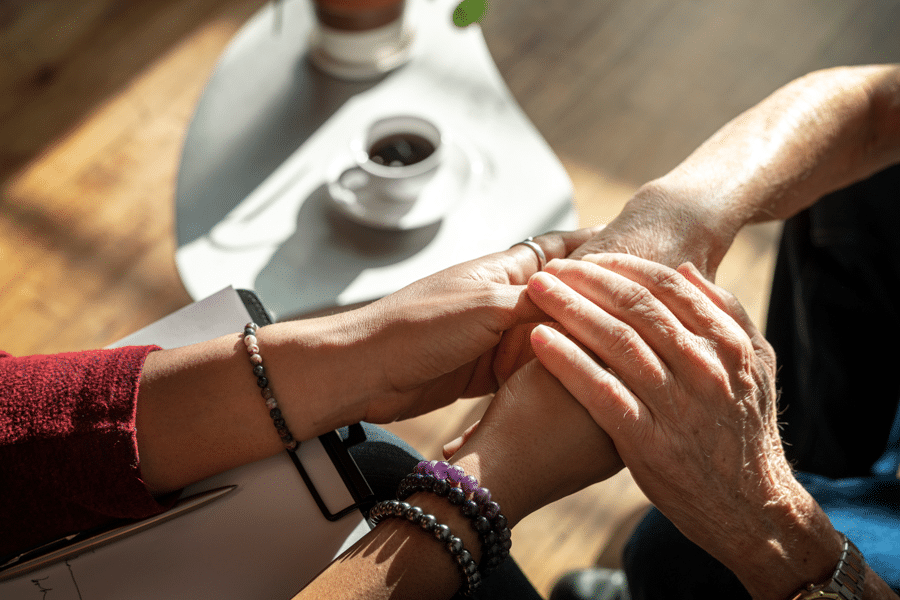Experiential
Addiction almost always has underlying causes. The most common of these include chronic stress, a history of trauma, and mental illnesses like anxiety and depression. Successful recovery from addiction requires working through these underlying issues and changing dysfunctional thought and behavior patterns.
SAMHSA stresses that there is no single pathway to addiction recovery that works for every individual. A high-quality treatment program will use a variety of therapies, classes, and interventions to address all physical, mental, and spiritual needs and problems.
At Laguna Shores Recovery Center in Dana Point, California, our Orange County rehab center utilizes experiential therapy methods to help people with a variety of addictions break the dangerous cycle and recover successfully.

What is Experiential Therapy?
Some experiential therapies include art therapy, horticultural therapy, and adventure therapy, which promote whole-person healing and support personal growth and empowerment. These therapies help by working through obstacles in a variety of settings and applying the lessons learned to “real” life.
Experiential therapies draw on the principles of cognitive-behavioral therapy and other traditional therapies. Research shows that experiential therapy helps individuals:
- Develop greater self-awareness
- Express complex feelings and synthesize difficult experiences
- Access buried feelings and experiences in a safe and supportive environment
- Recognize emotional responses to events and cope with negative emotions
- Initiate meaningful life changes
Staying in treatment for an adequate time is essential for successful recovery, and experiential therapies offer opportunities to have fun while learning more about yourself.
Kolb’s Four-Stage Experiential Learning Cycle
- Stage one involves engaging in a new experience in a concrete, hands-on way
- Stage two involves actively observing the experience as it unfolds and reflecting on it afterwards
- Stage three involves conceptualizing the experience into a new idea or concept or re-working an old concept based on the experience
- Stage four involves applying new or re-worked ideas into your life, allowing it to create a more positive perception of the world around you
Experiential therapies are led by trained therapists who move participants through these stages by facilitating activities, leading discussions, and helping participants transfer the lessons to their lives. The therapist helps you become more aware of your thoughts, feelings, and behaviors and develop healthier ways of thinking and behaving.
Common Experiential Therapies Used in Addiction Treatment
During art therapy, a variety of activities are used to help participants work through difficult emotions and make sense of complex experiences through creative self-expression. Activities used in art therapy include:
- Visually representing an experience through drawing or painting
- Creating an art journal and writing down reflections
- Reducing stress through art-making
- Expressing emotions with color, line, and shape
- Look at and discuss art in a group setting
According to an article published in the American Journal of Health, the benefits of art therapy include:
- Emotional healing
- Healthier thought and behavior patterns
- Decreased denial and reduced ambivalence toward recovery
- Increased motivation to stay in treatment and recover
- Increased self-awareness
- Reduced stress
- Reduced shame
![]()
Music therapy helps address a range of physical, emotional, and social needs. During music therapy, participants engage in activities like listening to and discussing music, writing songs or moving to music as a form of self-expression, creating music with instruments or the voice, and analyzing song lyrics.
Music therapy reduces feelings of depression, anxiety, anger, and stress. A study published in the Journal of Addictions Nursing found that music therapy improves motivation to change and increases engagement in treatment. It also helps participants:
- Improve their emotional state
- Express and work through difficult emotions
- Relax and reduce stress
- Open communication pathways
- Improve creative thinking
- Engage in personal changes
Horticultural therapy takes place in the garden, where participants learn to plant, nurture, and grow living things. The horticultural therapist helps participants view gardening as a metaphor for taking care of their own essential needs for a higher sense of well-being and greater personal growth. Diane Relf, a horticultural professor at Virginia Tech, says horticultural therapy improves self-confidence, self-esteem, and self-control. A large body of research into horticultural therapy shows that it’s also beneficial for:
- Improving self-awareness
- Improving mood
- Better decision-making and planning skills
- Self-expression and creativity
- Reducing negative emotions
- Relieving stress
Equine therapy involves working with horses, including grooming, feeding, leading, and riding them. Horses are pack animals, and they sense and respond to the emotions of other animals, including humans. During equine therapy, the horses serve as a sort of mirror. Participants can evaluate their own emotions and state of mind and get real-time feedback from the horse. The U.S. Department of Veterans Affairs cites equine therapy as effective for treating post-traumatic stress disorder, which often co-occurs with addiction. Other benefits of equine therapy include:
- Improved physical and mental strength, balance, and coordination
- Development of coping skills that transfer to other areas of life
- Restoring the brain’s compensation and assessment pathways
- Increased self-confidence
- Increased awareness of emotional states

Biofeedback therapy is an effective experiential therapy for reducing stress, which is a major relapse trigger. During biofeedback, sensors are attached to the body, and functions like blood pressure, heart rate, body temperature, muscle tension, and skin moisture are displayed on a monitor in real time. Participants learn how to reduce stress through strategies like deep breathing, progressive relaxation, and meditation. As they practice these exercises, they watch their body’s stress response diminish on the monitor.
Biofeedback helps people:
- Learn to recognize their body’s stress cues
- Reduce stress and anxiety on the spot
- Develop psychological confidence
- Reduce cravings
Adventure therapy takes place in nature and typically involves activities like climbing, hiking, camping, boating, and hiking. Other activities, like rope courses and zip lines, are also commonly used in adventure therapy.
Adventure therapy focuses on individual treatment goals. A trained adventure therapist monitors participants and ensures each is gaining positive momentum toward specific recovery goals. A study published in the journal Substance Abuse Treatment found that adventure therapy helps participants:
- Reduce the risk of relapse
- Reduce cravings for alcohol
- Reduce negative thoughts
- Reduce stress and the stress response
- Better concentration
- A more positive outlook on life
- Better control over impulses
Yoga is an experiential therapy that combines movement with controlled breathing and meditation. A certified yoga instructor leads participants through a variety of physical poses that increase physical and mental strength, flexibility, endurance, and balance. Sometimes, the instructor will incorporate spiritual teachings into the session.
Yoga roots participants in the present moment, where they’re able better to evaluate their thoughts, emotions, and bodily sensations. Yoga is used in many treatment programs to help people in recovery achieve:
- A higher level of mindfulness
- Greater self-awareness and body-awareness
- Reduced stress
- Reduced symptoms of PTSD
- Reduced cravings
- Improved stress response

Mindfulness meditation involves sitting quietly and focusing on your breath. As thoughts and physical sensations occur, you regard them neutrally, without judgment, and then turn your focus back to your breathing. With regular practice, meditation changes the structures of the brain, increasing the volume of the areas associated with self-concept, emotional regulation, and decision-making and decreasing the volume of the areas associated with fear, anxiety, and stress response.
Regular meditation changes the way your body responds to stress, and it reduces the urge to use drugs or alcohol during stressful times. According to an article in the journal Substance Abuse, meditation also:
- Reduces blood pressure
- Relieves pain
- Reduces feelings of depression and anxiety
- Promotes feelings of calm and inner peace
- Helps you respond better to negative external events
- Increases self-awareness and mindfulness
Be Brave. Get Help.
How Does Experiential Therapy Work With Evidence-Based Treatment?
- Enhancing Engagement: Experiential therapy can help engage individuals in the therapeutic process. By participating in dynamic activities such as role-playing, art therapy, or adventure therapy, patients may become more invested in their treatment. This increased engagement can make other forms of therapy, like cognitive behavioral therapy (CBT) or dialectical behavior therapy (DBT), more effective.
- Facilitating Emotional Access: Some individuals may struggle to access or express their emotions through traditional talk therapy alone. Experiential therapy provides an alternative means of emotional expression, which can enhance the effectiveness of evidence-based treatments by helping individuals confront and process difficult emotions.
- Addressing Trauma: Treatments like Eye Movement Desensitization and Reprocessing (EMDR) and Trauma-Focused Cognitive Behavioral Therapy (TF-CBT) are often used to treat trauma. Experiential therapy can complement these approaches by providing a safe, controlled environment for individuals to explore traumatic experiences.
- Promoting Mindfulness: Experiential therapy often emphasizes mindfulness and being present at the moment, skills that are also cultivated in traditional treatment exercises like Mindfulness-Based Cognitive Therapy (MBCT) and Acceptance and Commitment Therapy (ACT).
- Reinforcing Skills: The activities used in experiential therapy can reinforce skills learned in traditional treatments. For example, a group activity might reinforce social skills taught in Social Skills Training (SST), or an adventure therapy session might provide an opportunity to practice stress management techniques learned in CBT.
- Tailoring to Individual Needs: Both experiential therapy and evidence-based treatments can be tailored to meet the unique needs and preferences of each individual. This flexibility allows for a personalized program that can enhance effectiveness and improve outcomes.
By integrating experiential therapy with traditional treatment options, healthcare providers can offer a multi-faceted approach that addresses the full range of an individual’s needs and enhances their potential for recovery.
Reach out to verify your insurance coverage for addiction treatment
Can Experiential Therapy Be Used to Replace Traditional Addiction Programs?
Experiential therapy can offer unique benefits that complement traditional addiction treatments. It provides an alternative means of emotional expression and self-discovery, helping individuals understand why certain experiences have led them to substance abuse. It aids in breakthroughs where they were previously blocked, especially when used in conjunction with therapies like Cognitive Behavioral Therapy (CBT).
However, experiential therapies should not be used as the sole intervention in the treatment of alcohol use disorder or other addictions. It’s an enhancement to traditional treatment, not a standalone solution.

 Matthew Beck B.A, M.A, LMFT
Matthew Beck B.A, M.A, LMFT 


